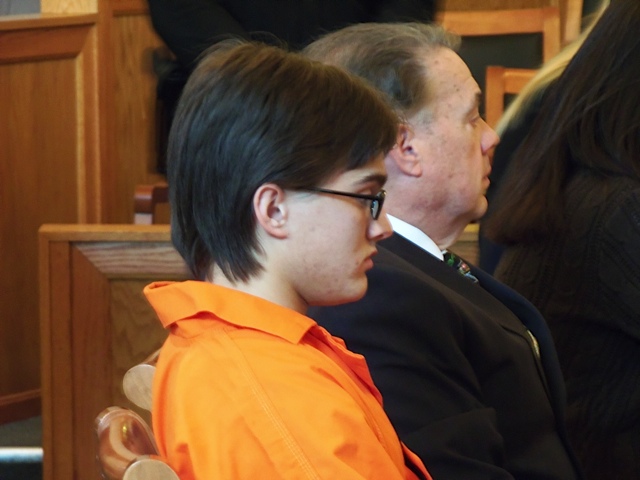West Union, WV - At ten minutes after one o'clock on Wednesday, January 15, Joseph Spencer was led into the Doddridge County Courtroom to stand before Doddridge County Circuit Court Judge Timothy Sweeney. Spencer was shackled at his hands and feet and wearing the bright orange jump suit issued by the correction facility. He was accompanied by defense attorneys Rodney Windom and Scott Wolfe. Brooke Fitzgerald, Doddridge County Prosecuting Attorney was accompanied by Phillip Morrison, II from the WV Prosecuting Attorneys Institute and by April D. Conner, Assistant Prosecuting Attorney for Doddridge County and Adult Probation Officer Kristen Layfield . Mr. Morrison was available during the entire investigation to provide training, service, support and resources to the DC prosecutors and staff. The goal of the Institute is to enhance and improve the quality of all prosecution throughout the State. they specialize in assisting smaller counties where specialized prosecutions are few and far between. This service allows the county prosecutors to continue with their caseloads and receive special assistance for unusual cases like this one.

Judge Sweeney entered the courtroom and all were told to rise by acting bailiff Tammy Satterfield. The Judge addressed the court with the case number, addressed all the defense and prosecution by name and noted that this was a change of plea hearing. The judge requested the plaintiff be sworn in and Clerk of Courts, Dwight Moore approached Joseph Spencer and swore him in to tell the truth.
Mr. Windom requested to approach the court to have the plea documents signed by the respective parties and the plaintiff in view of the Judge who granted the request. The defense team and Mr. Spencer approached the bench and standing before Mr. Moore, signed each of the three pleas under oath. Prosecutor Fitzgerald approved the signatures and the judge accepted all of the affidavits into the court record.
Ms. Fitzgerald addressed the judge to clarify the acceptance of the pleas. Both parties agreed that the sentences for counts one and two run concurrently (together) with one another and the sentence for count three run consecutively (following) with counts one and two. She further stated that her office holds letters of agreement with this action from members of the Spencer Family on behalf of the surviving members. Elizabeth Spenser asked to read a letter addressing the court in this matter. Judge Sweeney acknowledge the request and permitted her to read the letter aloud. She stated “We, the family…have worked with the Prosecutor Brooke Fitzgerald to come to this plea agreement. We support this plea and we believe it is in everyones best interest and it will bring some closure to a very difficult time. We believe justice will be served. The family included in this process includes myself, my brother Ian, my aunts Christy and Cathy, my uncles Denny and Eddie. Thank you.”
The judge then addressed Joseph Spencer and asked for him to tell in his own words the understanding of this plea agreement. Joseph replied, “Your honor, from what I understand I will be pleading guilty to counts one two and three of the indictment…” he paused to look at a paper on the desk where he had notes… He continued restating the sentences running concurrently and consecutively. “We ask the state would grant mercy on all three counts.”
Judge Sweeney, by law, had to ask several questions to insure that the plaintiff understood the plea agreement. Mr. Spencer reiterated and understood the sentences would run “thirty years to life before a chance of parole.”
Judge Sweeney asked Mr. Spencer to stand and addressed the court “Mr. Spencer in regards to the offense of murder in the first degree in regards to Fredrick Arthur Spencer III in the first count of this indictment, a felony, how do you plead?” Spencer replied “Guilty.” Sweeney continued, “In regards to the offense of murder in the first degree in regards to Dixie Lee Spencer in the second count of this indictment, a felony, how do you plead?” Spencer replied “Guilty, you honor.” Sweeney continued, “In regards to the offense of murder in the first degree in regards to Patience J. Spencer that is contained in the third count of this indictment, a felony, how do you plead?” Spencer replied “Guilty, your honor.”
Judge Sweeney asked Joseph Spencer directly “Are you pleading guilty because you intact believe yourself to be guilty?” he replied “Yes, your honor.” I did willfully, maliciously, intentionally, deliberately, pre meditatively did kill Fredrick A Spencer III, Dixie L. Spencer and Patience J Spencer.”
At this point in the plea hearing, the Judge addressed both prosecution and defense to see if both believed there is evidence beyond a reasonable doubt that Joseph Spencer did commit these murders. Both agreed.
Mr. Morrison, assisting the Prosecuting Attorney requested he read a statement that would remove any doubt as to the actions taken by Joseph Spencer on that day. He read “On the third of September, 2012, Mr. Spencer either found a loaded 9mm handgun or found the handgun and loaded it, depending on which version of the statement he made. He then went into the room where his father was sleeping on his stomach and he shot him in the back of his head, mortally wounding him. He then walked out of that room to the head of the exterior stairs of the building. His mother came, presumably running to see what was going on and he shot her at the foot of the stairs, mortally wounding her. He then proceeded down the stairs, stepped over her body, wedged open the door to the room with not much other chance of exit, and shot his nine year old sister. They all three died from their wounds. He later called 911 and was compliant when they told him to get in the yard, get on his knees, put the gun down and stay there until police arrived. Deputy Modesitt arrived, took him into custody, checked the scene. All three were passed at that point, they were all dead. And that is the facts we would prove had we gone to trial.” We have this from statements he made and Deputy Modesitt made.”
Judge Sweeney checked with Mr. Spencer as to whether he believed that the defense has provided him with every possible chance to defend himself.
At that point Mr. Spencer was informed that he had willingly and knowingly waived his constitutional rights.
Judge Sweeney scheduled the sentencing portion of the plea agreement for February 10, 2014.
Mr. Spencer was escorted immediately from the courtroom by detention officials to a waiting vehicle, leaving Courthouse Square area shorty after.
Follow-up: At a follow-up in Ms. Fitzgerald’s office, both she and Mr. Morrison answered questions by the media. They were asked if there was a motive in this case, Mr. Morrison stated that Joseph claimed he was abused, but the prosecution failed to see how that would be by a smaller, younger nine year old sister so we didn’t give that a lot of credibility. He explained that sometimes you just never find a motive. The plea agreement came from a lot of discussions with the family and they wanted this finished. The family did not want to comment and left the courtroom shortly after the proceedings. The prosecution team said that justice will be reached as Mr. Spencer will serve two consecutive life sentences in an adult prison. He will have to wait thirty years before he can even apply for parole. This sentence will never leave his life as if he were some day to be paroled, he will be under tight supervision the rest of his life. Life sentences cannot be discharged. His demeanor hasn’t changed from day one.

